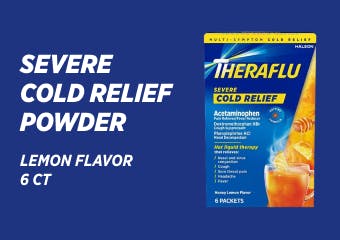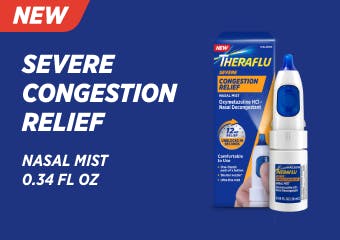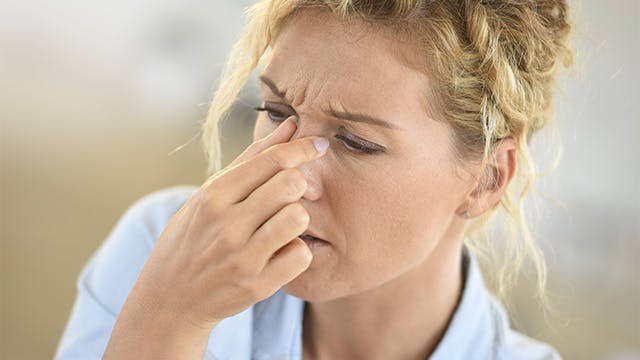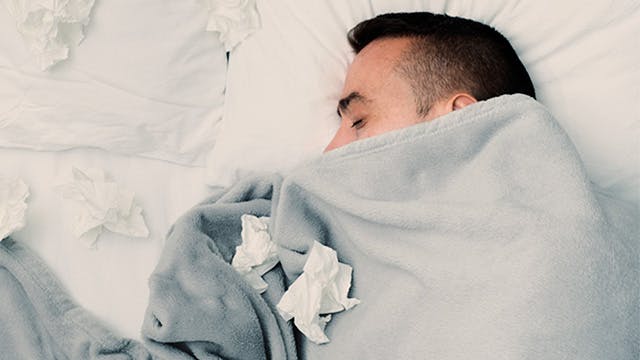Symptoms of a Sinus Headache
The indicators of a sinus headache may range from mild to severe symptoms. Common sinus headache symptoms include pain, pressure, and fullness in the forehead, brow, or cheeks, a stuffy nose, general fatigue, pain that gets worse when you bend forward or lie down, an ache or pain in the upper teeth area,ii thick, discolored nasal mucus, and a decreased sense of smell.iii You may experience a sinus headache alongside other cold-like symptoms like sore throat pain, fever, or cough.iv
Because they present similar symptoms, sinus headaches are often confused with migraine headaches—both worsen when you bend forward and can be accompanied by various nasal signs and symptoms including congestion, facial pressure, and a clear nasal discharge.v One of the primary ways in which a migraine differs from a sinus headache is that migraines tend to get worse with bright lights and loud noises. Nausea and vomiting are two additional common migraine symptoms that can help differentiate a migraine headache from a sinus headache.vi Talk to your doctor if you’re unsure whether your headache is due to sinus congestion or a migraine.
Causes of Sinus Headaches
Sinus headaches are caused by changes in the pressure of the sinuses that happen when the cavities around the nasal passages are inflamed.vii Sinus headaches typically present themselves in the aftermath of a cold or viral upper respiratory infectionvi and are also associated with allergies. Nasal growths, a weak immune system,viii hormonal changes, and having a personal or family history of migraines or headaches may increase your likelihood of getting sinus headaches.ix
How Long Do Sinus Headaches Last?
Sinusitis (sinus infection), which causes sinus headaches, typically takes two to three weeks to pass on its own.x Talk to your doctor if you experience any of the following:
- Your headache is severe and over-the-counter pain medication doesn’t offer relief
- You often have to miss school or work because of headaches
- Headaches are interfering with your daily lifexi
What Helps a Sinus Headache?
Whether you’re focusing on treatment or prevention, there are a number of ways to help eliminate the symptoms of sinus headaches. From a lifestyle perspective, getting enough sleep, eating regular healthy meals, managing stress, and engaging in aerobic exercise to reduce tension are all healthy habits to develop that can help prevent headaches.xii
If you do find yourself with a sinus headache during allergy season or after a cold, you can explore a few home remedies to help manage your discomfort. Try flushing out your sinus passages with a warm saline solution to clear your nasal passages with a nasal irrigation device. When used in combination with other sinus headache treatments, a nasal irrigation device can be an effective solution for relieving symptoms.xiii Stay hydrated to help thin out your mucus, drinking more water but less alcoholic and caffeinated beverages, as they can dehydrate your body. Get a humidifier for your home to help add moisture to the air and reduce dryness.
If your sinus headache is not responding to home remedies, you can try an over-the-counter medication like Theraflu Sinus & Pain or Theraflu Hot Liquid Powder. Talk to your doctor about the right approach and treatment to get the sinus headache relief you need. The product label defines the current company position with respect to the safe and effective use of the product. Contraindications, any special warnings and precautions for use, are described on the product label. If you are not sure whether a product is right for you, please consult with your doctor of pharmacist.





